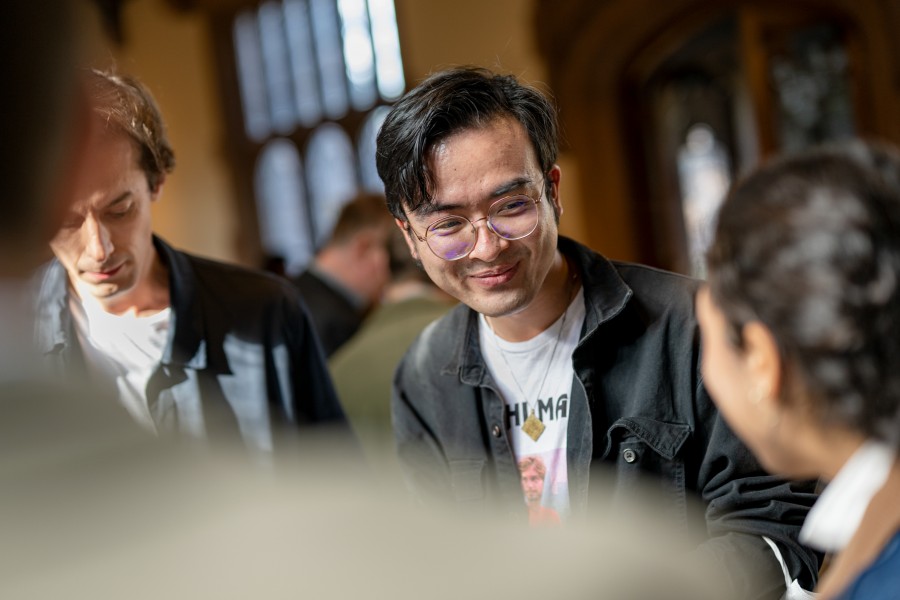PhD Program
Overview Block

Graduate student Xiaoyao Guo, 2022
Princeton’s graduate program in German offers students the opportunity to participate in a lively and engaged intellectual community composed of scholars working within an unusually wide range of interdisciplinary and theoretical approaches to German culture.
In addition to the full breadth and depth of the German literary tradition, our faculty specializes in intellectual history from 1700 to the present, media studies, critical theory, aesthetic philosophy, twentieth-century art (including painting and photography), cinema studies, feminism and gender studies, psychoanalysis, and systems theory. These specializations of the full-time members of our faculty are further complemented by our close affiliations with other departments and interdisciplinary programs at Princeton such as Architecture, Art and Archaeology, the Center for the Study of Religion, Comparative Literature, European Cultural Studies, History of Science, Judaic Studies, Media + Modernity, and Medieval Studies.
Intellectual Atmosphere
For sound academic reasons we try to keep the overall graduate enrollment small. The ideal figure is around twenty, with three or four of these students studying abroad in any given year. There is no distinction at Princeton between graduate and undergraduate faculty. All members of the department are in one way or another involved in the graduate program: as teachers, advisers, or teacher-training guides. The resulting student-faculty ratio is one of the strongest points of the program and assures ample personal contact between students and faculty for their independent work and dissertation. Students can receive expert individual counsel on almost any topic. Seminars are conducted as small and informal discussion groups ranging typically from five to ten participants. These groups frequently include students from neighboring departments and programs, such as The School of Architecture, Classics, Comparative Literature, History, French & Italian, English, and Music.
An important feature of the department’s intellectual life is a colloquium on a special topic, usually related to one of the current graduate seminars. The colloquiums combine papers from distinguished guest speakers and our own graduate students, who thereby have the chance to present their work in a professional setting that still has some of the feeling of “home.” Past colloquia have focused on Walter Benjamin, the theory of mass culture of the Frankfurt School, the idea of the university, German and Austrian women writers, Text, Hypertext, Cybertext, Weimar Media, and contemporary German art.
In addition to its permanent visiting faculty (Joseph Vogl, Berlin; Julianne Rebentisch, Berlin), the department also provides a variety of viewpoints and methodologies by regularly inviting distinguished guest professors for a term. Visiting professors have included Inka Mülder-Bach (Munich), Andreas Kilcher (Zurich), Gabriele Brandstetter (Berlin), Aleida Assmann (Konstanz), Winfried Menninghaus (Berlin), Rudolf Stichweh (Lucern), Wilfried Barner (Tuebingen), Dorrit Cohn (Harvard), Jochen Hoerisch (Mannheim), Alice Kuzniar (University of North Carolina), Eberhard Laemmert (Berlin), Jane O. Newman (UC Irvine), Michael Steinberg (Brown), Liliane Weissberg (University of Pennsylvania), David Wellbery (Chicago), Ann Marie Rasmussen (University of Waterloo) and Peter Fenves (Northwestern).
With the support of the Max Kade Foundation, the department has the opportunity to bring German artists and intellectuals to reside and teach at Princeton. Visitors in the past have included Heiner Mueller, Peter Schneider, Monika Maron, Martin Walser, Hans-Joachim Ruckhaeberle, and Durs Grünbein. We also sponsor a number of guest lecturers each year and offer students an opportunity to discuss the speaker’s topic with him or her in an informal setting following the lecture. Among many others, the following scholars have lectured here in past years: Leslie Adelson (Cornell), Hendrik Birus (Munich), Hartmut Boehme (Berlin), Christina von Braun (Berlin), Peter Ganz (Oxford), Sander Gilman (Chicago), Walter Haug (Tuebingen), Andreas Huyssen (Columbia), Hans Joachim Kreutzer (Regensburg), Biddy Martin (Amherst), Winfried Menninghaus (Berlin), Rainer Naegele (Yale), Ernst Osterkamp (Berlin), Brigitte Peucker (Yale), Eric Santner (Chicago), Theo Sommer (Die Zeit, Hamburg), Hartmut Steinecke (Paderborn), Wilhelm Vosskamp (Bielefeld), Klaus Weimar (Zürich), and Werner Williams (Augsburg).
Departmental graduate students are active in discussions among themselves, with visitors, and with the faculty. Both students and faculty have the opportunity to present their work in our monthly “Works in Progress” series.
Further Information
The Graduate Handbook supplements the departmental statement in the Graduate School Announcement and offers prospective students an overview of the program and the opportunities it provides.
If you have questions or would like additional information, please write or email to our Director of Graduate Studies.




